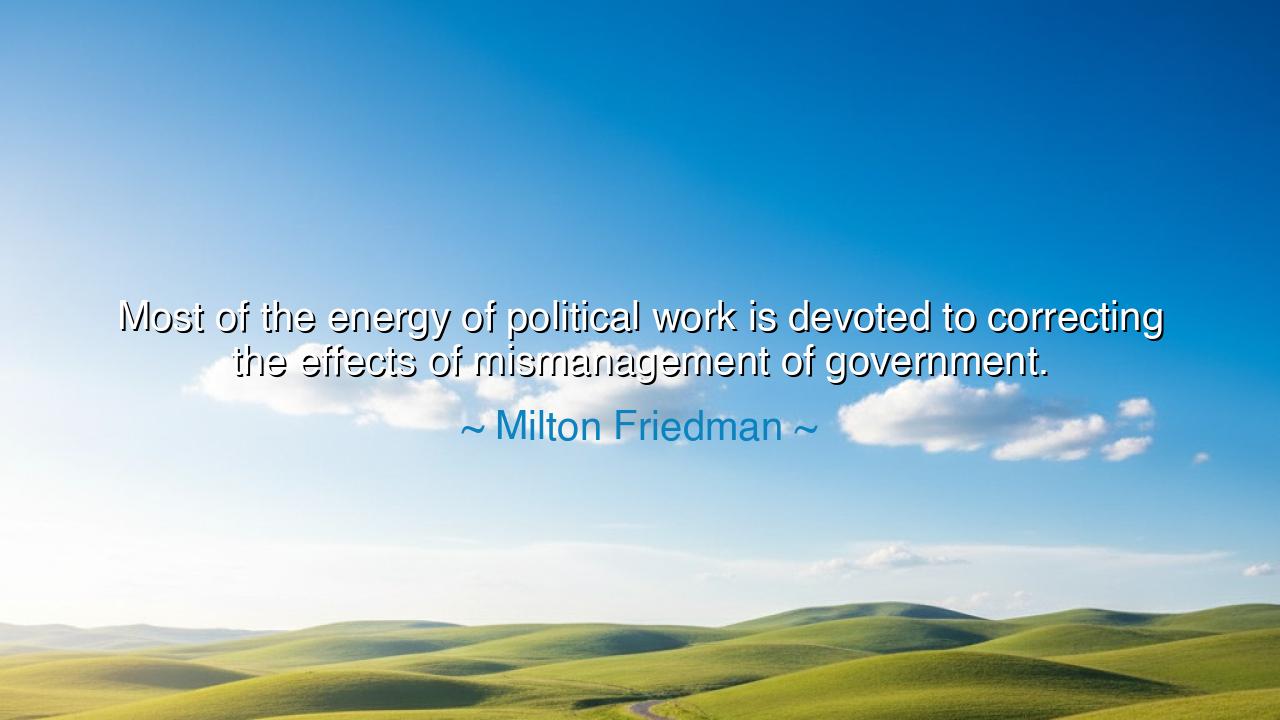
Most of the energy of political work is devoted to correcting the
Most of the energy of political work is devoted to correcting the effects of mismanagement of government.






The words of Milton Friedman, the great economist and defender of liberty, fall like a calm yet devastating truth: “Most of the energy of political work is devoted to correcting the effects of mismanagement of government.” In this observation lies a mirror held up to the structure of civilization itself. Friedman exposes the irony that the very machine built to solve problems often becomes the source of them, and that much of politics, far from advancing progress, becomes a cycle of repairing the damage created by earlier repairs. His voice, though measured, carries the tone of warning—a reminder that the most dangerous force in society is not malice, but mismanagement born from good intentions.
At the heart of this quote is the idea that government, though necessary, is inherently prone to error. It wields vast power, yet is guided by imperfect men, swayed by short-term thinking, partisanship, and the illusion of control. Every law, every regulation, every act of intervention sets in motion new forces—some unseen, some unintended. When these consequences arise, the instinct of politicians is not to admit failure, but to create more laws to fix the problems they themselves have caused. Thus, the energy of governance, instead of building, becomes consumed in endless correction. It is a system that, without humility and restraint, feeds on its own inefficiencies.
The origin of Friedman’s insight can be traced to his lifelong critique of excessive government control over markets and individual life. As a Nobel laureate and advocate of free enterprise, he observed firsthand the inefficiencies and distortions caused by bureaucratic intervention. His studies of inflation, taxation, and public policy revealed a consistent pattern: well-intentioned government programs often produced the very problems they sought to solve. In the 20th century, welfare policies that aimed to eliminate poverty sometimes entrenched dependency; price controls designed to protect consumers led to shortages; central planning that promised fairness stifled innovation. Friedman’s words arose not from cynicism, but from empirical truth—a truth that history continues to confirm.
One of the most vivid examples of this truth unfolded during the Great Depression. In an effort to stabilize the economy, the U.S. government introduced layers of interventions—tariffs, wage controls, and massive regulatory experiments. Yet as Friedman and his colleague Anna Schwartz later revealed, the Federal Reserve’s own mismanagement of monetary policy deepened and prolonged the crisis. What should have been a temporary correction became a decade of suffering. Later generations of leaders spent years trying to repair the very collapse that government policy had helped create. In this, we see Friedman’s warning embodied: the cycle of correction, the futile chase to repair damage born from pride and error.
But this pattern is not confined to history—it lives in every age. When governments overspend to stimulate growth, they create inflation, then must fight inflation with higher taxes and austerity. When they seek to protect industries through subsidies, they often breed inefficiency and corruption. When they regulate excessively, they strangle the very productivity that sustains their nations. The result is an endless pendulum: policies born to fix yesterday’s mistakes become tomorrow’s new disasters. Friedman, ever the realist, understood that this is not because men in power are evil, but because power without humility always breeds folly.
Yet his message is not despair—it is instruction. Friedman’s philosophy teaches that the cure for mismanagement is not more management, but freedom guided by responsibility. He believed that individuals, when trusted to act in their own interest within fair and transparent rules, produce better outcomes than any central authority could design. The energy wasted on correcting bureaucratic failures could instead be spent on innovation, education, and enterprise—the living forces that make societies thrive. To trust people more than institutions is to honor the wisdom of the collective heart over the arrogance of the few.
The lesson, then, is timeless and deeply moral: beware of the arrogance of control. Governments, like men, must learn restraint; they must understand that the world is too complex to be engineered from above. Citizens, too, must awaken to their responsibility—not to expect salvation from the state, but to build wisely in their own spheres of influence. The wise will question authority not out of rebellion, but out of reverence for liberty. For when freedom is lost in the pursuit of perfection, mismanagement becomes the new tyranny.
So let the words of Milton Friedman endure as a torch for every generation: do not spend your life fixing the errors of those who refused to admit their limits. Let governments serve by doing less but doing it well; let citizens demand efficiency, transparency, and restraint. For only when we replace the arrogance of command with the humility of stewardship will our political energy no longer be wasted in repair—but devoted, finally, to creation.






AAdministratorAdministrator
Welcome, honored guests. Please leave a comment, we will respond soon